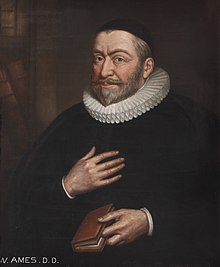William Ames
William Ames , also Latinized as Guilielmus Amesius (* 1576 in Ipswich ; † November 14, 1633 in Rotterdam ) was an English Reformed theologian who worked mainly in the Netherlands . He is not to be confused with the Quaker William Ames († 1662), who also worked in the Netherlands for a long time .
Life
Ames, son of a merchant, was raised in the spirit of Puritanism by his uncle Robert Snelling . From 1594 he studied at Christ's College , Cambridge , among others with William Perkins (1558-1602), the leading theologian of the Puritans in the Church of England . After receiving his master's degree in 1601, Ames was appointed a fellow of Christ's College. After a sermon against dissolute student life in December 1609, however, he had to give up this position. He was elected pastor of the parish in Colchester but was not confirmed by the London Bishop George Abbot . Because the position of the Puritans in England became more and more difficult, he traveled to the Netherlands at the end of 1610 . After a short stay in Leiden (with John Robinson ) and Rotterdam (disputation with the Arminian Nicolaas Grevinckhoven († 1632)) he was appointed garrison preacher with the English troops in The Hague in 1613 . At the Dordrecht Synod in 1618/19 he took part as an observer for the Calvinist party and advised President Johann Bogermann .
In 1619 Ames was appointed to look after a student residence at Leiden University. The planned appointment as professor of theology at the University of Leiden failed due to resistance from George Abbot. Instead, Ames became a professor at Franeker University in 1622 , where he made a lasting impression on numerous students. In 1632 he became pastor of a refugee community in Rotterdam, but died shortly before the planned move to New England .
Work and meaning
At the latest with the translation of the text "English Puritanism" by William Bradstaw (1610), Ames emerged as a decided exponent of orthodox Calvinism and strict puritanism. His main theological work Medulla theologica shaped the leader of the “precise” direction in Dutch Protestantism, Gisbert Voetius . At the same time, however, with his determination of conscience as an autonomous authority and his federal theology, he influenced the “Nadere Reformatie ( closer Reformation )” and is considered to be the pioneer of Reformed Pietism . Johannes Coccejus in particular accepted him in this sense.
Fonts (selection)
- Coronis ad collationem Hagiensem, qua argumenta pastorum Hollandiae adversus Remonstrantium quinque articulos de divina praedestinatione, et capitibus ei adnexis, producta, ab horum exceptionibus vindicantur . Elzevir, Leiden 1618
- Medulla theologica . Amsterdam 1623 (English: The marrow of sacred divinity . London 1642; new edition: The marrow of theology . Grand Rapids, Mich: Baker Books, 1997)
- Bellarminus Enervatus, sive disputationes anti-Bellarminianae . Amsterdam 1628
- De conscientia, et eius iure vel casibus: Libri quinque . Amsterdam 1630 (German: Von dem Recht des Gewissens / und Desselben giving cases: In V. books . Nuremberg: Endter, 1654; English: Conscience with the power and cases thereof . 1639; Reprint Amsterdam [ua]: Theatrum Orbis Terratum [ ua], 1975)
- The substance of Christian religion: or, A plain and easie draft of the Christian catechisme . London 1659 (New edition: A sketch of the Christian's catechism . Grand Rapids, Mich: Reformation Heritage Books, 2008)
- A fresh suit against human ceremonies in God's vvorship . [Rotterdam?], 1633 (Reprint: Springfield, Ill .: [Scholarly Repr.], 2000)
- The work of the Reverend and faithfull minister of Christ, William Ames . London: John Rothwell, 1643.
- A declaration of the witness of God manifested in me from my youth . Sl 1656
literature
Encyclopedia Articles
- Wilhelm Gaß : Amesius, Wilhelm . In: Allgemeine Deutsche Biographie (ADB). Volume 1, Duncker & Humblot, Leipzig 1875, p. 399.
- James Bass Mullinger: Ames, William (1576-1633) . In: Leslie Stephen (Ed.): Dictionary of National Biography . Volume 1: Abbadie - Anne. , MacMillan & Co, Smith, Elder & Co., New York City / London 1885, pp. 355 - 357 (English).
- Martin Schmidt : Ames, William (1576-1633) . In: Theologische Realenzyklopädie Vol. 2, 1978, pp. 450–453.
- Friedrich Wilhelm Bautz : AMESIUS, Wilhelm. In: Biographisch-Bibliographisches Kirchenlexikon (BBKL). Volume 1, Bautz, Hamm 1975. 2nd, unchanged edition Hamm 1990, ISBN 3-88309-013-1 , Sp. 145.
- Thomas Kaufmann : Amesius, Guilielmus . In: Religion in Geschichte und Gegenwart , 4th ed., Vol. 1, 1998, Col. 409.
Monographs and Articles
- Karl Reuter: Wilhelm Amesius, the leading theologian of the awakening Reformed Pietism . Bookstore of the educational association, Moers [1940].
- Keith L. Sprunger: The Learned Doctor William Ames: Dutch Backgrounds of English and American Puritanism . University of Illinois Press, Urbana 1972.
- W. van 't Spijker: Guilielmus Amesius (1576-1633) . In: T. Brienen: De Nadere Reformatie en het Gereformeerd Pietisme . The Hague, 1989, pp. 53-86.
- Robert C. Walton : The Visible Church A Mixed Body or a Gathered Church of Visible Saints. John Calvin and William Ames . In: W. van 't Spijker (Ed.): Calvin: Heritage and Order. Festschrift for Wilhelm Heinrich Neuser on his 65th birthday . Kok Pahros, Kampen 1991, pp. 168-178.
Web links
- Digitized prints by William Ames in the Post-Reformation Digital Library
- Material by and about Ames on the website "A Puritan's Mind"
| personal data | |
|---|---|
| SURNAME | Ames, William |
| ALTERNATIVE NAMES | Amesius, Guilielmus; Amesius, Wilhelm |
| BRIEF DESCRIPTION | reformed theologian |
| DATE OF BIRTH | 1576 |
| PLACE OF BIRTH | Ipswich |
| DATE OF DEATH | November 14, 1633 |
| Place of death | Rotterdam |
